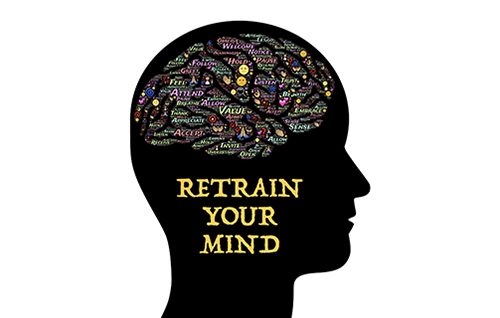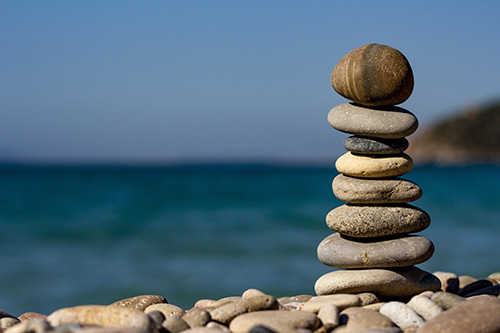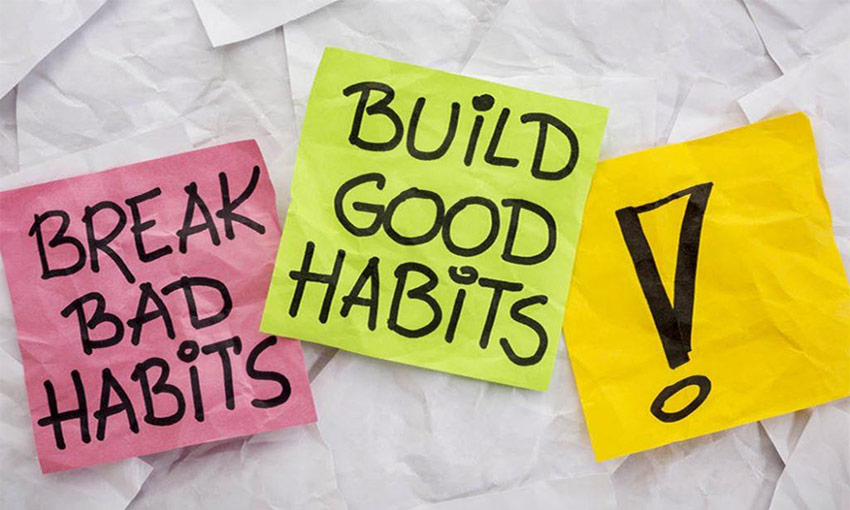Our daily decisions affect us deeply, like breaking bad habits, and they have the power to shape our future, for good or for worse. New Year’s resolutions are a great way to rid of a bad habit and make a new one. We set important goals for ourselves, prepare our mindset and tools to help us reach them, then work diligently to achieve them.
But often times, our attempts to break these habits fail. Why?
The ability to resist temptation and our willpower deteriorates. As a result, our motivation wanes, and we withdraw into our old ways, like a river resisting to branch off, avoiding newer paths because it’s easier to not resist.
This is a sure way to get frustrated and, ultimately, get burnt out.
When you’re content where you are, it’s all too easy to give in. You either stop trying to reach a goal because it appears unattainable, or you settle for anything midway between where you are now and where you desire to be.
But, with the right mindset, you can make progress. Let’s look into some ways how.
Here are 6 steps to breaking bad habits:
1. Focus on why you’d like to change

What are you aiming to accomplish by breaking or changing a habit? Changing a habit is easier when the change is desirable or beneficial to you.
Consider why you want to quit the habit and any benefits you see as a result of the change. Make a list of these reasons to see if you can think of any others that haven’t come to mind yet.
For further motivation, write out your reasons on a piece of paper and place it on your refrigerator, bathroom mirror, or wherever you’ll see it most. If you use a computer often, save the list on your desktop and open it frequently to remind yourself. The key is to stay super organized.
Speaking of lists, you know what’s a hard habit to break? Neglecting lists! They only work if you read them.
Seeing the list can assist you to recall the change you want to make. If you find you’re struggling to change your habit, your list will serve as a reminder of why you should keep trying.
What’s the takeaway?
Bad habits lead to late nights of self reflection. Life can be hard enough as it is, with kids, work, reaching your goals, or whatever else it is you’re trying to achieve. Recognizing a bad habit and focusing on breaking it will make life just a little easier if you can manage to succeed.
2. Let go of the all-or-nothing mindset

Accept that you will almost certainly make mistakes while attempting to change a habit. It’s ok to fail while you are trying. And this is because failure is temporary, as long as you are establishing a strategy on how to improve your next attempt.
You can’t prevent the feelings of failure and unhappiness when you do fail, but you can learn to recognize these feelings and accept that the process will make you stronger.
If you slide back into an old habit, you might wonder, “Can I really do this?” You may begin to doubt yourself and feel as if you should give up.
Instead, concentrate on the slightest process you’ve made, overcome your fears, and imagine the life you could live without being controlled by your habits. Maybe you’ve been trying to quit smoking for three days and have been successful. But on the fourth or fifth day, you relapse.
It happens. Everyone slips up. don’t break yourself over it.
Let it be a learning lesson. You’ve gone three days without smoking! It’s incredible! If you can do three days, then you can double it and do six. And if you can go a week without it, you can inch your way into a month and more.
Have you ever heard that the turtle wins the race? The turtle is slow and steady, clear minded, and focused on the goal. Sure, the turtle might have to walk around a few big stones, but at least he won’t trip over them.
What’s the takeaway?
A lot of people have this all-in-one mindset, where reaching a goal is black and white. But the truth is, it’s not that simple. There are grey areas during the journey to breaking a bad habit. Slipping up isn’t a complete failure. In fact, it’s expected and is your lesson to know your limits, to become stronger, and to inch yourself closer to your goal.
3. Start with a small project

Are you trying to break multiple habits at the same time? When you’re first trying to quit harmful habits, the image of a newer, better you can be a tremendous motivator. You imagine this version of you that’s completely different than who you are now.
This newer version may do things totally opposite of how you currently do them. It may be that you no longer smoke, you don’t have compulsive behaviors, you don’t talk too much, and you have perfect grades in school because you’re not slacking anymore.
This idea of yourself is invigorating. But then, you begin to contemplate if it could be real.
“Can I Really Break These Habits?”
“This New Life Seems Too Good To Be True.”
You may get overwhelmed because the thought of breaking these many habits seems unreal. Maybe what you should do is try to imagine your new self with just one less bad habit. Work toward breaking that one, first. And once you’re ready, move on to the next.
Let the process be gradual. Everything doesn’t have to happen at once. Too many changes at once can be debilitating and could strike symptoms of anxiety.
What’s The Takeaway?
Sometimes we imagine this perfect future version of ourself, totally ridden of bad habits. We want it so bad, but we’re unsure if we can make these many changes to make it real. Change is hard.
Instead of imagining yourself so different, try imagining yourself exactly how you are now, but with one less bad habit. That seems more real, doesn’t it? Focus on one change at a time.
4. Reduce your stress levels

There are many behaviors that are linked to the dopamine (or reward) system in the brain, such as smoking or consuming sugar. Dopamine is a “feel-good” chemical that allows brain neurons to communicate with one another in a positive way.
Dopamine release causes a euphoric feeling the first time you engage in a new, “rewarding” behavior. This changes the connections between neurons as well as the brain circuits that control actions. It’s one reason we may develop bad habits in the first place.
This tendency to rely on these dopamine hits is something that’s built into our genes. I’m sure you’ve heard the common phrase, “addiction runs in my family.”
The mechanisms responsible for these overactive processes which lead to addiction can be passed down through genetics.
So if this is you, you’ve got one more odd against you. But that doesn’t mean it’s the end.
If you train yourself to recognize that your bad habits need to change, and you try to not stress and go with the process of healing, you will surely rid of your habits.
What’s the takeaway?
What’s harder than having bad habits and addiction? Stressing about them and laser focusing on how they are negatively effecting on you. You know the saying, “Stress only makes it hurt twice”?
It’s true. You really do feel an added layer of pain when you stress about the pain you’re already experiencing. You feel the pain, then you feel new pain because you’re focusing on the original pain.
Telling someone not to stress is easier said than done. But you have two options:
- Be stressed and let it debilitate you, making it harder to break your bad habits.
- Or work on reducing your stress, first, and give yourself the strength needed to succeed in making changes to improve yourself.
5. Consider the cumulative influence of good practices

Have you heard of compound interest? I’m sure you have. In finance, it’s just the interest you earn on your interest. Seems like a pretty great way to make money right? Let your interest do all the work.
Now imagine that instead of gaining compound interest, you had to pay compound interest.
It’s a double-edged sword. When it benefits you, it REALLY benefits you. And when it doesn’t, it can be detrimental.
Let’s now apply compound interest beyond finances. We’re going to apply it to your journey on breaking those bad habits.
Imagine that each action you take daily has a receipt attached to it. If it’s a good action that benefits your progression toward breaking the habit, then you get a receipt as if someone paid you money. But if it’s a bad action—something that hinders your progression, you get a receipt as if you made a purchase.
Now imagine that each receipt has a compound interest note attached to it.
If today you have a lot of good actions, then tomorrow those actions will continue to pay you in interest. And if you have bad actions, well, you get where I’m going with this. Tomorrow you will owe more than you lost today.
This is how life works. The things you do today will continue to help you or hurt you in the future. So it’s important to consider that each small action you makes does impact you in ways that you might not see today.
What’s the takeaway?
The actions you make today are like compound interest in finances. The things you do which benefit you, even if those things are very minute actions, will help you tomorrow. And if those things are bad, then tomorrow they will continue to hurt you, physically, emotionally, economically, or however they are associated with the action you made.
Your actions can be beneficial or detrimental depending on if your behaviors encourage or hinder self-improvement. Whether you’re attempting to learn a new language, find a new hobby, establish a business, or quit smoking cigarettes, your progress is affected by your ability to believe in the power of small change.
6. Make distinct environments

I’m sure you’ve heard of “guilty by association”. Regardless if you are directly involved with something, if you are in any way associated with the people, events, or objects, then your reflection will appear.
Habits are the same way. They are all about associations. When you have a habit, rather it be good or bad, there will always be other things in life that remind you of that habit.
It could be that you play guitar at the beach, and so, beaches remind you of playing guitar. Or you always drink alcohol when you go out with friends. And so, when you go out with friends you feel like you need to consume alcohol.
If you are trying to break a bad habit, during the beginning phases you should spend time identifying what that habit is associated with. These are called “triggers”.
Identifying and avoiding triggers is essential to breaking bad habits.
To break a habit, you need to rid of these triggers and build new context to your environment and way of living. Spend time finding new environments to build new habits that are free of any negative behavioral links.
What’s the takeaway?
Breaking bad habits is all about avoiding triggers. Spend some time identifying what those triggers are, rather they be physical objects, environments, people, or behavioral tendencies you or others have.
Figure out what is fueling your habit, and work to create a plan to cut off the source of fuel.
Conclusion
Bad habits can be detrimental to your life and to those around you. As much as you might want to quit the habit, it can be very difficult. This is especially true if you have triggers that you might not be aware of or that are hard to cut off.
The big takeaway is to first identify the bad habit, then focus on how your life will change without it, make a plan, take small steps, mitigate your stress levels, consider that your actions today will impact you tomorrow, and reduce the triggers that keep the habit going.
Before you know it, breaking the habit will be just a bad memory from your past. Best of luck!
Here’s a quick recap of 8 steps to breaking bad habits:
- Focus on why you’d like to make a change.
- Relax and let go of the all-or-nothing mindset.
- Start with a small project.
- Reduce your stress levels.
- Consider cumulative influence of good practices.
- Make distinct environments to develop good habits.
That’s all folks! Thanks for reading.
Feel free to comment below if you liked this article on 6 steps to breaking bad habits. I’d love to take questions or suggestions on other content you’d like to see on eHowdy!
